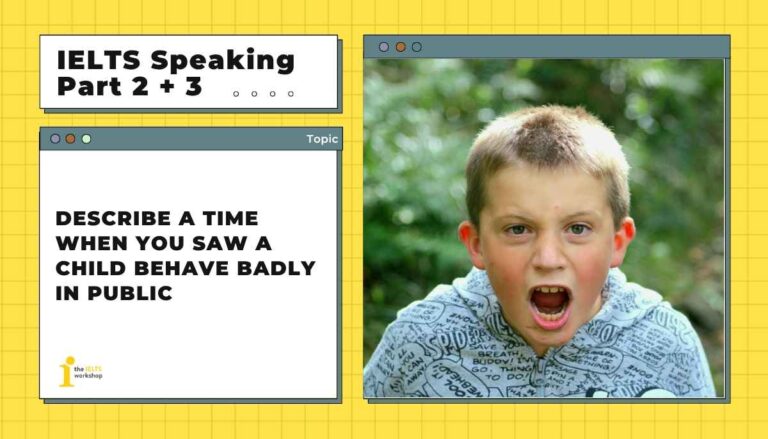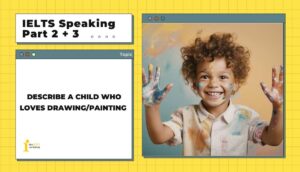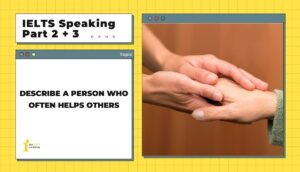Chủ đề Describe a time when you saw a child behave badly in public yêu cầu người học kể lại một trải nghiệm thực tế, đồng thời thể hiện cảm xúc và quan điểm cá nhân. Trong bài mẫu dưới đây của thầy Hoàng Phi Long tại The IELTS Workshop, bạn sẽ thấy cách triển khai mạch kể chuyện tự nhiên, kết hợp từ vựng miêu tả và đánh giá tình huống tinh tế.
Part 2: Describe a time when you saw a child behave badly in public
You should say:
- When it was
- Where it was
- What the child was doing
- And explain how you felt about it
1. Bài mẫu chủ đề Describe a time when you saw a child behave badly in public (Sample)
One situation that I still remember clearly happened a few months ago in a public park near my house. It was a warm and sunny Sunday afternoon, and the park was quite crowded with people enjoying their weekend.
While I was sitting on a bench listening to music and scrolling through my phone, I noticed a young boy, probably around five or six years old, near the playground area. At first, he seemed energetic, running from one activity to another. But after a while, I heard him start shouting. It turned out that his mother told him it was time to go home, and he didn’t want to leave.
He suddenly threw a big tantrum — screaming loudly, kicking the slide, and even throwing handfuls of sand at other children. The boy’s mother looked embarrassed and tried to calm him down by talking gently, but he refused to listen. Instead of becoming more strict or removing him from the situation, she ended up giving in and let him keep playing just to avoid more attention.
To be honest, I felt quite uncomfortable watching everything happen. The boy’s behavior was not only disturbing the peaceful atmosphere but also affecting other families in the park. I understand that dealing with small children can be very challenging, especially when they’re emotional, but I also think that if parents always give in, kids might learn that bad behavior gets them what they want.
After a while, I decided to move to a quieter part of the park, away from the playground. The whole situation stuck with me, though, because it made me think about how important parenting is — not just at home but also in public spaces where children are learning how to behave around others.
Sample by Hoang Phi Long, IELTS Teacher at The IELTS Workshop
2. Từ vựng chủ đề Describe a time when you saw a child behave badly in public (Vocabulary)
- threw a big tantrum: nổi cơn thịnh nộ, ăn vạ
- kicking the slide: đá vào cầu trượt
- throwing handfuls of sand: ném từng nắm cát
- gave in: nhượng bộ, chịu thua
Xem thêm: Bộ từ vựng chủ đề Trẻ em (Children) trong tiếng Anh
Part 3:
1. What do young children do when they behave badly?
When children misbehave, they often throw tantrums, scream, cry, disobey instructions, or refuse to cooperate. Some might become physically aggressive, like hitting others or throwing toys. These actions are usually caused by frustration, boredom, or a desire for attention.
- Disobey: không nghe lời
- Physically aggressive: có hành vi bạo lực về thể chất
- Frustration: sự bực dọc, ức chế
2. How should parents stop their children from behaving badly?
Parents should respond in a calm and firm way. Setting clear guidelines and being consistent with discipline helps children know their limits. It’s also useful to praise them for behaving well. In certain situations, taking the child aside or out of the public area can help them cool down.
- Consistent with discipline: nhất quán trong cách kỷ luật
- Praise (v): khen ngợi
3. Were parents in the past more strict with their children than parents these days?
Yes, I believe that in the past, parents were definitely stricter with their children. In traditional families, children were expected to follow rules without asking questions. Discipline was often enforced through physical punishment or very serious consequences. These days, parenting styles have changed a lot, more lenient specifically. Parents now tend to focus more on communication and emotional support. Instead of punishing children right away, they try to understand the child’s feelings and explain why certain behavior is wrong. This modern approach helps children feel heard and more emotionally secure, but some people argue that it may lead to children becoming less respectful or obedient
- Physical punishment: hình phạt về thể chất
- More lenient: nhẹ nhàng
- Emotionally secure: an toàn về mặt cảm xúc
4. Whose influence on children is more important — friends or parents?
I think both friends and parents influence children in different ways, but overall, parents have a stronger and more long-term impact. Parents shape a child’s basic values, beliefs, and behavior from a very young age. For example, a child usually learns how to treat others, how to manage emotions, and what is considered right or wrong from their parents.
However, as children grow older — especially during their teenage years — friends become more important. Peer pressure can strongly affect a child’s choices, such as what they wear, what music they listen to, or even how they behave in social situations. Still, if a child has a strong foundation from home, they are more likely to make better decisions, even if their friends act differently.
- Peer pressure: áp lực đồng trang lứa
5. The best way to change a child’s bad behavior is to set a good example. What do you think?
I believe the most effective way is to use positive reinforcement. Instead of focusing only on punishment, parents should praise or reward children when they behave well. For example, if a child helps clean up their toys or speaks politely, they can be given a small reward like extra playtime. This encourages them to repeat good behavior and helps reduce bad habits over time.
- Positive reinforcement: củng cố tích cực
Từ vựng mở rộng theo chủ đề
- Parenthood: Việc làm cha mẹ
- Home birth: Sinh tại nhà
- Methods of contraception: biện pháp tránh thai.
- Maternal age: Độ tuổi sinh sản.
- Financially secure/ stable: an toàn/ ổn định về tài chính.
- Chances of fertility: cơ hội để sinh sản.
- Life’s milestones: các giai đoạn / dấu mốc của cuộc đời
- Parental guidance: Sự hướng dẫn từ cha mẹ.
- The high cost of raising a child: chi phí (tài chính) cao để nuôi dạy một đứa trẻ.
- Mental health: sức khỏe tinh thần.
- Personality formation: hình thành các tính cách.
- Social skills: kỹ năng xã hội
Xem thêm: Cách học từ vựng IELTS hiệu quả từ thầy Đặng Trần Tùng 9.0
Tạm kết
Hy vọng bài mẫu vừa rồi đã giúp bạn hình dung rõ hơn cách triển khai ý và sử dụng ngôn ngữ hiệu quả khi gặp chủ đề Describe a time when you saw a child behave badly in public trong IELTS Speaking Part 2 & 3.
Để nâng cao khả năng phản xạ và mở rộng vốn từ, bạn có thể luyện tập thêm nhiều chủ đề khác, đồng thời tham khảo các tài liệu hữu ích như KHO BÀI MẪU IELTS SPEAKING và Bộ đề dự đoán IELTS Speaking Quý 2 (T6 – 08/2025) – Full 3 Parts.
Đăng ký ngay lớp HỌC IELTS MIỄN PHÍ cùng các giáo viên tại The IELTS Workshop – đăng ký ngay hôm nay nhé!









